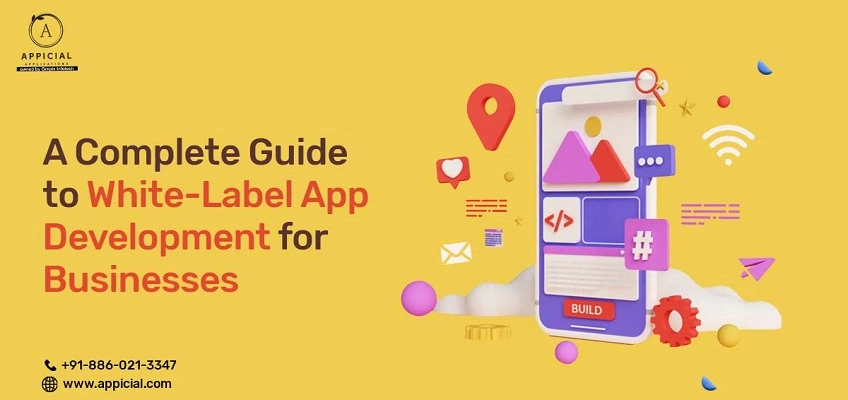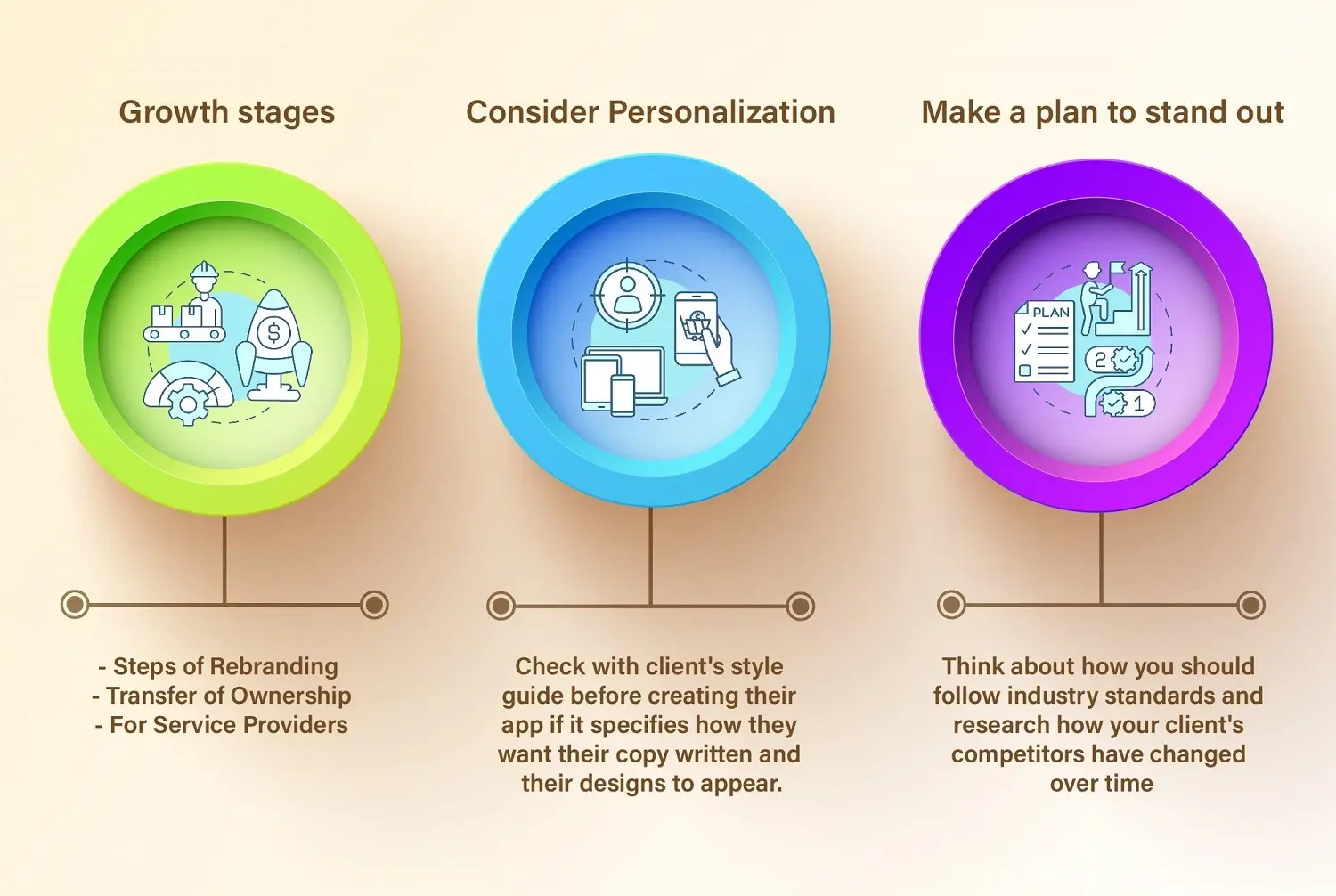
A Complete Guide to White-Label App Development for Businesses
- 1. What is a White Label App?
- 2. What is Mobile App Reselling?
- 3. How to Resell White Label Mobile Apps?
- 4. Why White-label Apps are so Interesting?
- 5. White Label App Development Process
- 6. Things You Must Do Before Making White-Label App For Client
- 6.1 Design and user experiences
- 6.2 Identify the features you want for your app
- 6.3 Barriers to sales
- 6.4 Possibility of customization
- 6.5 Learn about the web presence of the clients
- 6.6 Cost of development
- 6.7 Maintenance
What if you could have a fully functional, branded app up and running in weeks, not months, without the hefty price tag of custom development?
In today’s fast-paced digital world, businesses across all sectors are constantly looking for smarter, faster, and more affordable ways to enhance their operations, engage customers, and expand their reach. White-label app development emerges as a compelling solution to this need, offering companies the ability to brand and customize pre-built applications as their own.
We'll explore the key benefits of adopting white-label software, including reduced development time and costs, focus on core business strengths, and seamless integration capabilities. Additionally, we'll delve into the critical steps involved in selecting and customizing a white-label app, strategies for effective implementation, and best practices to maximize the return on your investment. By the end of this guide, you'll be equipped with the knowledge and tools to effectively leverage white-label app development to propel your business forward.
This guide is crafted to demystify the concept of white-label app development for businesses of all sizes. Whether you're a startup aiming to penetrate the market quickly, or a mid-sized enterprise looking to expand your service offerings, white-label solutions can provide a significant strategic advantage. For large corporations aiming to innovate cost-effectively, these solutions also offer a smart and scalable approach.
We'll also highlight the top benefits of white-label software, like faster development, lower costs, and easy integration. Plus, we’ll guide you through selecting, customizing, and implementing the right app to maximize your ROI. By the end, you’ll have everything you need to use white-label apps to boost your business.
Discover the advantages of white-label app development for businesses with our comprehensive guide. Whether you're a startup or an established company, this blog post breaks down the concept of white-label apps, explores their benefits, and provides practical insights into how businesses can leverage white-label solutions to enhance their brand presence and deliver value to their customers.
What is a White Label App?
A white-label app is a generic application developed by a company to be rebranded and resold by other businesses. Essentially, it is a ready-made product that can be customized with an organization’s own branding, logo, and identity, allowing them to present the app as their own to their customers without having to build it from scratch.
Let’s say Mr. X wants to launch his own taxi service app called "X-Cabs." Instead of building an app from scratch, Mr. X purchases a white label taxi app. This pre-built app already includes all the necessary features, like ride booking, payment integration, driver tracking, and user ratings. The original app creator, who developed this software, handles all the complex backend processes and updates.
Mr. X’s role is to customize the app with his branding, such as changing the logo to X-Cabs, adjusting the color scheme, and possibly adding a few specific features. He then launches X-Cabs to customers, who can now book rides easily using the taxi app, which looks and feels like a unique, custom-made product.
By using a white label taxi app, Mr. X avoids the long and expensive process of building an app from the ground up. He can focus on promoting his brand and growing his business while the white label provider manages the technical side of the app. This model helps Mr. X get to market faster and more affordably.
Benefits of White-Label Apps for Businesses
White-label apps offer numerous benefits for businesses looking to expand their brand presence and streamline operations without having to invest heavily in technology development from scratch. Here are some key advantages:
1. Cost-Effectiveness
Developing a custom app from scratch is an expensive undertaking that involves extensive research, design, testing, and maintenance. White-label apps provide a cost-effective alternative, as they come pre-developed. Businesses simply purchase the right to use the existing software and customize it to their branding needs. This model eliminates the high initial development costs and allows companies to focus their budget on enhancing and marketing the app.
2. Time Savings
Time is a critical factor in technology adoption and market entry. White-label apps are essentially ready-made solutions that only require rebranding and minor modifications to align with a company’s specific needs.
This drastically reduces the development time from potentially months or years to just a few weeks, allowing businesses to launch their applications quickly and stay ahead of competitors. For example, a white label taxi app allows entrepreneurs to enter the ride-hailing market swiftly, offering a fully functional, branded solution without the lengthy development process.
3. Proven Frameworks
White-label apps are built on proven, tested, and reliable frameworks. They have been deployed across various industries and have undergone extensive testing and optimization.
So, businesses can skip the risks and delays of custom app development, ensuring a faster and more secure market entry. This also significantly reduces the likelihood of encountering critical bugs and stability issues, providing a smooth and reliable user experience from the start.
4. Focus on Branding
For many businesses, especially those without in-depth technical expertise, developing an app can be a daunting task that diverts attention from core activities like branding and customer engagement.
White-label apps allow companies to focus on what they do best, branding and marketing, while leaving the technical complexities to the developers of the app. This can lead to better utilization of resources and enhanced brand visibility.
5. Easy Entry Into New Markets
White-label apps give businesses, especially small to medium-sized enterprises (SMEs), an easy way to enter new markets without a large upfront investment in technology. Companies can quickly launch in a new market using a product that already meets basic user needs. This allows them to test the market with less financial risk. By choosing white-label app development, businesses can also benefit from customizable app solutions that can be adjusted to fit their brand and target audience.
White Label App Development Process

Developing a mobile white label taxi app involves three steps:
1. Growth stages
A service provider commonly referred to as a white-label production company develops a fully working app with a particular objective and target market in mind.
a) A rebranding step
An app that has been altered and updated with a new brand and tagline might be used as a reseller's product.
b) Transfer of ownership
The client, a reseller, a company that either ordered a solution or bought an already-made app, gains possession of the app. White-label applications are advantageous to business owners and resellers alike.
c) White label application development for service providers
White label applications could potentially provide development teams with some important advantages, like:
- Faster time to market by leveraging a pre-built solution.
- A ready customer base from resellers and businesses looking for customizable app solutions.
White label applications could potentially provide development teams with some important advantages like:
d) Obtain a fresh source of recurrent income
- Access to reselling opportunities without restrictions;
- Use the feature as a service model to give rudimentary functionality, resell, and create other features for a cost.
2. Consider Personalization
Without a doubt, your client will want to customize the app. Therefore, you must make sure that the white-label app you create for them adheres to their brand guidelines. For instance, if you’re developing a white-label taxi app, it’s essential to tailor the user interface and experience to match the client’s brand while keeping the core functionality intact. Customizing a taxi app not only enhances the client’s branding but also helps them stand out in a competitive market. Therefore, you cannot approach each app in the same manner.
Depending on the audience and preferences of your client, you'll need to make smart alterations. Check your client's style guide before creating their app, if it specifies how they want their copy written and their designs to appear. The app complements its other marketing materials, helping them establish a stronger identity and a more noticeable online presence.
3. Make a plan to stand out
When considering white-label taxi app development for a client, consider how other applications for companies in their industry have been produced. Think about how you should follow industry standards and research how your client's competitors have changed over time.
Instead of copying your rivals, make your customer stand out by providing something unique and worthwhile. If your client's website is already responsive and mobile-optimized, you do not need to recreate it in app form.
The next step is to determine whether there are any unmet consumer needs.
Also Read: The Future of Mobile App Development: Trends, Techniques, and Tips
Things You Must Do Before Making White-Label App For Client
1. Design and user experiences
The most crucial elements in the app development are design and user experience. You must pay attention to the app's design if you want it to function better. For example, in a white-label taxi app, users should quickly see their location, book a ride in one tap, and track their driver in real time. If the app looks messy or feels slow, users will leave.
You will find all essential and modern features and cutting-edge functionality with the white-label app development services. But, after that, you must adhere to the predefined design that these development services give. You can hire a group of professional developers to provide the service, and they can build a mobile application to meet your marketing requirements.
2. Identify the features you want for your app
Putting your ideas into practice is the next step toward a successful sale. You won't succeed in this field if you're not a seasoned IT professional. You receive a set structure in the white-label app. Although you did not create the app with your company model, you can easily request content and arrange everything in a predetermined order.
One of the greatest advantages of customizable app solutions includes more flexibility. In addition, the general app structures and features are adaptable. Therefore, if your program has characteristics that will enhance its value, it will benefit you and greatly help you.
You'll also require a trusted partner that can respond to your inquiries and assist you in carrying out your ideas. The idea of hiring a professional is better due to the following reasons:
i. FINANCIAL OUTLAY
You'll need to rent an office, identify, and hire IT engineers before you can begin working on your project. Although it sounds great, putting it into practice can be a complete disaster. Specific company requirements, the time required for CV research, and the costs associated with onboarding processes can result in a large financial outlay.
ii. FREELANCER RISKS
Many highly skilled and trained people are willing to work for you on platforms like Upwork. However, this decision has a unique set of disadvantages. Due to remote work, various time zones, cultural differences, work attitudes, and other issues, hiring freelancers may be a waste of time.
iii. TEAM BUILDING CHALLENGES
The current market, fortunately, provides another choice. However, remember that you'll need to assemble a large team of professionals, including a designer, front-end, back-end, and QA engineers.
And as experience has demonstrated, it is nearly impossible to assemble a team of heroes on a freelancing network, let alone manage them well.
3. Barriers to sales
By acquiring a white-label taxi app, customers risk losing their credibility. By putting their name on the products you and your team have created, they seize control of them. However, they cannot guarantee the app's correctness because they were not involved in the manufacturing process.
Furthermore, the sales procedure would be challenging because of the intense market rivalry. This work may not be straightforward in the early phases of the white label app lifetime, but it is crucial. Find and hire a sales professional, preferably one with experience in the white goods sector.
4. Possibility of customization
Your customers want their logos to display on your iOS and Android white label apps. Unfortunately, this is how white label creation works: you produce software that blatantly emphasizes the value of other companies.
The design of your app should be straightforward, clear, and simple to modify. Put an end to using amazing visual effects because your client's vision can differ from yours, and you don't want to redesign anything.
5. Learn about the web presence of the clients
Look into the companies who might be interested in buying your white-label app and your target market. You can choose anything that might be helpful in this circumstance, from company websites to Facebook pages.
Let’s say you’re offering a white label taxi app. Start by researching local taxi companies or small transportation startups. Check out their websites and Facebook pages. Notice their branding, bright colors, friendly tone, and a focus on family-safe rides. Use these insights to customize your app’s design and features, making it a perfect fit for their business and increasing your chances of closing the deal.
6. Cost of development
White-label apps cut costs by using a single codebase for multiple clients. Developers make small changes to match each brand, so the overall expense stays low. This model works well for startups and small businesses with limited budgets.
So, instead of spending months and thousands on custom app development, you get a ready-to-launch product at a fraction of the cost. You also avoid the risks and delays that come with building from scratch.
If cost matters to you, choose white-label app development services. They offer a fast, reliable, and budget-friendly way to enter the market without sacrificing quality. It's the most practical approach to app development for growth-focused businesses.
7. Maintenance
Maintenance is key in app development. With a white-label app, you don’t need to worry about bugs. Once you adopt a white-label solution, the developers continue to monitor the app, addressing any issues that arise and performing regular updates. This includes retesting the app whenever new features are added, ensuring that everything works seamlessly.
Regular maintenance ensures that the app is always running smoothly and securely, without requiring your direct involvement. The app stays reliable and stable, and you don’t have to worry about troubleshooting bugs or vulnerabilities, as these are handled by professionals. This level of support makes white-label apps a smart choice for businesses looking for hassle-free, long-term solutions.
Conclusion
In the dynamic and ever-evolving digital landscape, businesses must adapt quickly to stay competitive and meet the demands of their customers. White-label app development offers an ideal solution for companies looking to expand their digital offerings without the substantial time and financial investment required for building apps from scratch. By leveraging proven frameworks and focusing on customization and branding, businesses can launch robust, reliable, and user-friendly apps in a fraction of the time.
At Appicial Applications, we are committed to providing top-tier white-label solutions that empower businesses to achieve their digital goals efficiently. Our pre-built applications are designed to be easily customized, ensuring they align perfectly with your brand identity and specific needs. We understand the importance of a strong market presence, and our white-label apps enable you to enter new markets swiftly and effectively.
Partner with us to unlock the full potential of white-label app development. Let us handle the technical complexities while you focus on what you do best—building your brand and engaging with your customers. Together, we can drive your business forward, ensuring you stay ahead in the competitive digital landscape.
For more information on how our white-label app solutions can benefit your business, contact us today. Let’s build the future of your business together.
Looking out to start your own venture like Uber? Try out our HireMe Taxi Uber Clone, the easiest way to kick-start your taxi business.





